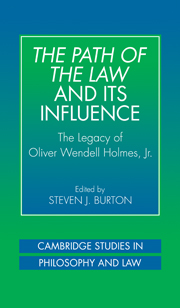Book contents
- Frontmatter
- Contents
- Acknowledgments
- List of Contributors
- The Path of the Law and Its Influence
- Introduction
- 1 Law as a Vocation: Holmes and the Lawyer's Path
- 2 The Bad Man and the Good Lawyer
- 3 Why Practice Needs Ethical Theory: Particularism, Principle, and Bad Behavior
- 4 Theories, Anti-Theories, and Norms: Comment on Nussbaum
- 5 Traversing Holmes's Path toward a Jurisprudence of Logical Form
- 6 Holmes on the Logic of the Law
- 7 Holmes versus Hart: The Bad Man in Legal Theory
- 8 The Bad Man and the Internal Point of View
- 9 Oliver Wendell Holmes, Jr., and William James: The Bad Man and the Moral Life
- 10 Emerson and Holmes: Serene Skeptics
- 11 The Path Dependence of the Law
- 12 Changing the Path of the Law
- 13 Holmes, Economics, and Classical Realism
- 14 Comment on Brian Leiter's “Holmes, Economics, and Classical Realism”
- Appendix: The Path of the Law
- Index
2 - The Bad Man and the Good Lawyer
Published online by Cambridge University Press: 22 October 2009
- Frontmatter
- Contents
- Acknowledgments
- List of Contributors
- The Path of the Law and Its Influence
- Introduction
- 1 Law as a Vocation: Holmes and the Lawyer's Path
- 2 The Bad Man and the Good Lawyer
- 3 Why Practice Needs Ethical Theory: Particularism, Principle, and Bad Behavior
- 4 Theories, Anti-Theories, and Norms: Comment on Nussbaum
- 5 Traversing Holmes's Path toward a Jurisprudence of Logical Form
- 6 Holmes on the Logic of the Law
- 7 Holmes versus Hart: The Bad Man in Legal Theory
- 8 The Bad Man and the Internal Point of View
- 9 Oliver Wendell Holmes, Jr., and William James: The Bad Man and the Moral Life
- 10 Emerson and Holmes: Serene Skeptics
- 11 The Path Dependence of the Law
- 12 Changing the Path of the Law
- 13 Holmes, Economics, and Classical Realism
- 14 Comment on Brian Leiter's “Holmes, Economics, and Classical Realism”
- Appendix: The Path of the Law
- Index
Summary
One of the great virtues of Robert Gordon's essay is to remind us that The Path of the Law started as a speech – and not just a speech, but a speech at a ceremonial occasion – and not just a speech at a ceremonial occasion, but a ceremonial speech belonging to a popular nineteenth-century genre, the vocational address.
But what a vocational address it is! Gordon argues that Holmes “would seem to have shredded all of the fancy costumes in which nineteenth-century lawyers tried to dress up their profession,” that he places “skeptical roadblocks across all of the generally recommended paths for those who would seek meaning and value in the lawyer's work.” I agree; and I agree as well with Gordon's second principal point, that Holmes nevertheless held the lawyer's job in high, sometimes fantastically romantic, esteem. The question is why.
One possible reason that The Path of the Law offers slim pickings for the lawyer's vocation could be that it is not primarily a vocational address. As readers of his speeches know, Holmes had a marvelous sense of occasion, and the occasion of its delivery was the dedication of a law-school building. Perhaps, then, the speech, delivered to law students, is not about how to practice law, but how to study law. The first four words are “When we study law,” and Holmes reminds us of his topic no fewer than ten times.
- Type
- Chapter
- Information
- The Path of the Law and its InfluenceThe Legacy of Oliver Wendell Holmes, Jr, pp. 33 - 49Publisher: Cambridge University PressPrint publication year: 2000
- 1
- Cited by

